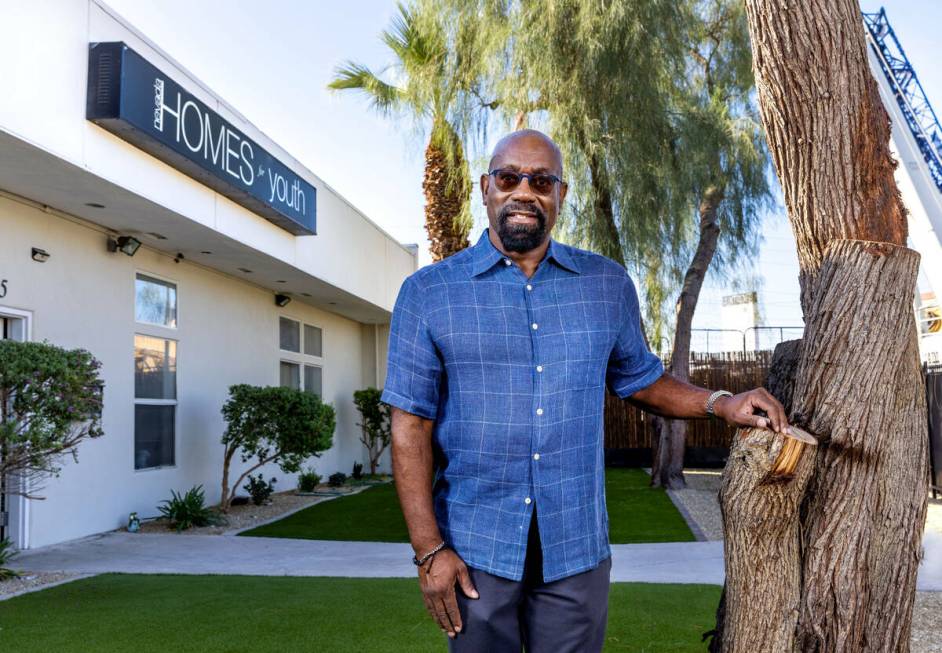How do you turn teens around? He starts with their view of police

After more than three decades and helping hundreds of kids, Ronald Moore remembers the police officer and the police camp he attended as a teen in Nebraska that inspired him to run a mentor program for wayward teens in Las Vegas.
Moore, 66, executive director of Nevada Homes for Youth, which temporarily houses and counsels kids, many of them minorities with troubled home lives, said one of his approaches is to urge his teen “clients” to change their views of police in general.
“They look at the police in a negative way instead of a positive way and being a kid of color you see a lot of police when things are going bad,” Moore said.
“Police are really helping people and getting people out of trouble,” he said. “When I went to police camp, we got to see that these people have families, they have kids. They’re just like everybody else, but they just wear a badge. And I’m trying to get kids to understand that and trust the system and trust law enforcement and the court system.”
His clients range in age from 13 to 18 and are assigned to him by order of the Clark County Family Court to live at the home’s current location, a former apartment building on South 13th Street near East Charleston Boulevard, typically for from three to six months.
“Most of the kids we work with are in the care of the county or the state,” he said
“It’s a combination of things. We’ve had kids whose parents that are on drugs, (they) didn’t have a place to live and then the kids … get caught up in drugs,” he said.
Moore, who holds a bachelor’s degree in criminal justice and received a master’s in social work from UNLV, founded Nevada Homes for Youth in 1991 at first at Commercial Center on East Sahara Avenue before raising enough funds to buy their current building in 1998.
His county-funded program, which he said has mentored “hundreds of kids” over the years, provides a stable place for each new child and assesses their needs to learn how to proceed with them, he said.
“Some of the issues that we’re seeing, besides the drug issues, is behavior issues, kids that have been kind of abandoned from their home situation,” he said.
“One of the things that I see just from my experience is some of these kids just need guidance, role models,” Moore said.
Often, single moms with teenage boys “get into situations where they need help,” he said.
After the kids settle in, the program sets them up in school if needed, arranges for medical treatment and therapy for mental health or drug abuse, coordinates visits with family members and “just get them away from all those negative environments and then try to make some positive things happen to them,” he said.
A horse therapy program allows teens to visit a small local horse ranch and pet, brush and ride the animals, learn horse safety etiquette and clean the stables. Most of the kids had never been near a horse, he said.
Inside the home, several computers and screens are set up in a large living room, with chairs and couches near the doorways to kids’ individual rooms and then an open kitchen. The program houses up to 10 clients, Moore said, and had five in the program this month.
The teens are not permitted to drink alcohol or smoke anything, Moore said. School buses arrive nearby to take them to and from school, which for many is Valley High School, he said.
‘How can I ever repay you?’
Moore recalls how he grew up in a single parent family without a father in Lincoln, Nebraska, and had problems until he met his mentor, the police officer “who kind of took me under his wings and helped me grow up and stay out of trouble and that kind of thing.”
“And when I finished college, and he helped me through all of this stuff, and I’m like, ‘How can I ever repay you for what you did for me?’ He said, ‘Help somebody else.’ And I’ve been doing that.”
One former client is a local attorney, another an apartment manager. One moved him by showing up at the home in a U.S. Marines uniform.
It’s been tougher recently with the rise in the use of fentanyl and other dangerous drugs by adolescents who arrive needing treatment and counseling, he said.
“We can help anyone who wants to make that change,” he said. “So sometimes we get kids that have really hit rock bottom and they’re tired of being passed around, sleeping on couches and they’re looking for help.”
It’s all about “letting them know there’s people out there that care about them and letting them see that,” he said.
Contact Jeff Burbank at jburbank@reviewjournal.com or 702-383-0382. Follow him @JeffBurbank2 on X.